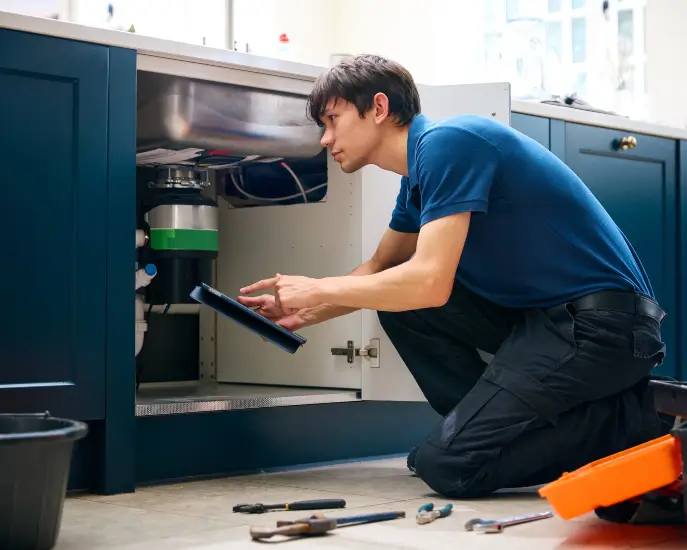
Best Practices for Using a Garbage Disposal
Garbage disposals are a modern kitchen marvel, simplifying the disposal of food waste and making kitchen cleanup more efficient. However, improper use and lack of maintenance can lead to clogs, odors, and even damage to your unit. Whether you’re a seasoned pro or new to using a garbage disposal, understanding best practices is crucial for keeping this appliance in top working condition. Our plumbing team at Puget Sound Plumbing & Heating offers tips and best practices for using a garbage disposal in Seattle, Washington.
Tips for a Clog-Free Kitchen
Using a garbage disposal correctly can prevent many common issues. First and foremost, always run cold water while the disposal is in use. The water helps to carry the food particles through the blades and into the drain, reducing the risk of clogs. We recommend feeding the disposal small amounts of food at a time rather than dumping large quantities all at once to ensure the blades can efficiently chop up the waste. Avoid putting fibrous or starchy foods like celery, potato peels, and pasta down the disposal, as these can wrap around the blades or form a gluey mass that can clog the pipes. It’s also a good idea to avoid pouring grease or oil down the drain, as they can solidify and cause blockages. Instead, wipe greasy pans with a paper towel before washing them.
How to Clean a Garbage Disposal
Cleaning your garbage disposal is essential for preventing odors and maintaining its efficiency. Start by disconnecting the power to the disposal to ensure safety. Next, you can clean the rubber splash guard by scrubbing it with an old toothbrush and soapy water. For disposal, a mixture of ice cubes and rock salt can help dislodge debris and sharpen the blades. Another method is to grind lemon or orange peels in the disposal. The citrus oils will help to freshen the unit and break down any stuck-on grime. Flush the disposal with hot water and a bit of dish soap to remove any remaining residues.
Regular Maintenance Tips
Regular maintenance can significantly extend the life of your garbage disposal. One of the simplest yet most effective maintenance tasks is to run the disposal regularly. Even if you don’t have food scraps to grind, running the disposal with cold water and a bit of dish soap can help keep the blades moving and prevent rust. Periodically check for leaks around the unit and tighten any loose bolts. It’s also beneficial to use a garbage disposal cleaner every few months to keep the unit in top condition. Ensuring that only appropriate items go down the disposal can prevent damage and reduce wear and tear.
What Can’t Go Down a Garbage Disposal
Knowing what not to put down your garbage disposal is just as important as knowing what can go down it. Items like bones, coffee grounds, eggshells, and non-food materials should never be put at the disposal. These items can damage the blades, cause clogs, and even break the motor. Fibrous vegetables like celery, corn husks, and artichokes can wrap around the blades and cause jams. Starchy foods like rice, pasta, and potato peels can expand with water and create clogs. By avoiding these items, you can prevent many common disposal problems.
Signs of a Failing Garbage Disposal
It’s important to recognize the signs of failing garbage disposal to address issues before they become major problems. Unusual noises like grinding or metal-on-metal sounds often indicate something is wrong. Frequent clogs, even with routine maintenance, can also be a sign that your disposal is nearing the end of its life. Other signs include persistent odors that don’t go away with cleaning and water leaks from the unit or the bottom of the sink. If you notice any of these signs, it might be time to consider repairing or replacing your garbage disposal.
How Long Do Garbage Disposals Last
Garbage disposals typically last between 8 to 15 years, depending on usage and maintenance. Heavy use or improper care can shorten the lifespan, while regular maintenance and correct usage can help extend it. If your disposal is nearing the end of its expected lifespan and experiencing frequent issues, it might be more cost-effective to replace it rather than repair it. Understanding the average lifespan of a garbage disposal can help you plan for its replacement and avoid unexpected breakdowns. Investing in a high-quality unit and following best practices can maximize its longevity.
Environmental Considerations
Using garbage disposal has both positive and negative environmental impacts. On the plus side, disposals can help reduce the amount of food waste sent to landfills, which decreases methane emissions—a potent greenhouse gas. However, disposals can also contribute to water pollution if not used responsibly. To minimize the environmental impact, consider composting vegetable scraps and using the disposal for items that can’t be composted. This approach can help reduce your carbon footprint and support a more sustainable lifestyle.
Achieve a Cleaner, Greener Kitchen
Proper use and maintenance of your garbage disposal can save you time, money, and hassle. By following the best practices outlined in this post, you can prevent clogs, reduce odors, and extend the life of your disposal. Regular cleaning and mindful disposal habits ensure your appliance remains in top condition. Taking care of your garbage disposal not only benefits your kitchen but also contributes to environmental sustainability. Implement these tips today and enjoy a smoothly running, efficient kitchen appliance for years to come. Contact our team at Puget Sound Plumbing & Heating to learn more about our plumbing services and how we can help keep your kitchen running smoothly.


